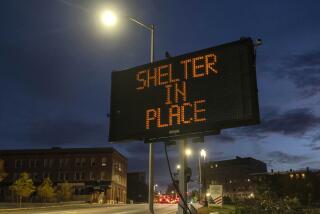Trump’s four positions on gun control in one week
President Trump has offered four responses to the killings of 17 students and staff at Marjory Stoneman Douglas High School in Florida: banning sales of guns to people younger than 21; expanding background checks; new regulations to ban so-called bump stocks, which were used in the previous horrific mass shooting in Las Vegas; and arming teachers.
The first three of those ideas could put him in conflict with gun rights supporters.
The fourth is the only one Trump has talked about at any length.
I’m David Lauter, Washington bureau chief. Welcome to the Friday edition of our Essential Politics newsletter, in which we look at the events of the week in Washington and elsewhere in national politics and highlight some particularly insightful stories.
Arm the teachers
The White House tried several ways to showcase Trump responding to the shooting before settling on one that appeared to work for them. The day after the shooting, Trump tried a brief speech from the White House. Then he traveled to Florida and visited survivors and first responders. Both of those fell flat. Trump has difficulty showing empathy, at least in public, as Christi Parsons wrote, and his attempts appeared awkward, at best.
Trump’s comfort zone involves advocating action and being on offense. One of his favorite rhetorical stances is to claim that he gets things done, unlike his predecessors, who just talked.
Critics would note that his claims of action often run way ahead of reality. But on shootings, the problem runs deeper as a desire to get things done quickly butts up against the reality that Republican lawmakers have blocked action on gun legislation for years.
Trump’s initial way of resolving that conflict was to lash out at a different adversary. Over the Presidents Day weekend, as he sat at his Florida resort, unable to indulge in his usual weekend golf routine for fear of seeming insensitive, he lashed out at the FBI, suggesting in tweets that the bureau’s investigation of Russian efforts to sway the 2016 election was somehow to blame for its failure to stop the Parkland shooter.
By Tuesday, back in Washington, the president had dropped that line of attack, and instead announced that he had directed the Justice Department to issue regulations banning bump stocks, devices that effectively turn a semi-automatic weapon into a fully automatic one.
That call matches the position of the National Rifle Assn., which endorsed a regulatory approach to bump stocks as a way to avoid new legislation on guns.
The Justice Department branch that regulates guns — the Bureau of Alcohol, Tobacco, Firearms and Explosives — has said in the past that it lacks legal authority to ban bump stocks, meaning that any new regulations are almost certain to be challenged in court. As a result, an effort to ban bump stocks by regulation likely will guarantee that they’ll still be available for sale for a long time.
On Wednesday, Trump hosted an extraordinary, televised session with students and parents. Mostly, he sat and listened as they offered intensely personal testimony about the impact of school shootings. But in brief remarks, Trump tipped his hand about the response that most appealed to him: Arm teachers.
If a teacher or coach had a weapon handy when the shooter entered the school, he said, “that would’ve been the end of it.”
On Thursday, Trump pushed more intensely for arming school personnel, insisting that “we have to harden our schools, not soften them.” He also addressed it during his speech at CPAC (watch here.)
That idea drew significant criticism, and not just from gun control supporters.
Florida’s Republican Sen. Marco Rubio, pointed out one immediate problem: “Imagine in the middle of this crisis, and the SWAT team comes into the building, and there’s an adult with a weapon in their hands. And the SWAT team doesn’t know who’s who, and we have another tragedy that was unnecessary,” he said.
But the real tipoff about the lack of any concrete plan behind the rhetoric came in a passing remark from Trump. The debate “isn’t so much about funding, it’s about common sense,” he said Thursday.
At the federal level, however, debates are always about funding. Washington doesn’t regulate public schools, which are run and paid for locally. The main lever the federal government has for influencing what schools do is the carrot of federal money. Without that, Trump’s call for more armed personnel in schools — whether it’s a good idea or a bad one — may amount to nothing more than words.
As for two other items on Trump’s list, barring sales of long guns to people under 21 and expanding background checks, the White House has yet to endorse a specific proposal. And Trump has taken care to repeatedly praise the NRA, which has ardently backed him. The gun rights group has opposed both proposals in the past.
Will Trump really push for legislation the NRA opposes? Perhaps, but his record on other issues suggests otherwise. On immigration, for example, Trump has several times offered to back compromise proposals, only to pull back when confronted by angry supporters on his right.
California Democrats meet for convention
Team Politics in California will be covering the party’s state convention that begins Friday. Don’t miss that coverage in the moment on our Essential Politics news feed and all weekend. We’ll have complete coverage in Monday’s newsletter.
Russia probe expands
A week ago, Robert S. Mueller III, the special counsel investigating Russia’s involvement in the election, reminded everyone of how little we really know about where his efforts are headed. Mueller issued an indictment of 13 Russians, headlined by an oligarch with close ties to Russian President Vladimir Putin. As David Cloud and Joe Tanfani reported, the timing and scope of the indictments took Washington by surprise — no word had leaked that any such actions were coming.
Over the next few days, Mueller also secured two more guilty pleas from people who, according to court documents, played bit parts in wider efforts to defraud the U.S.
Then on Thursday, prosecutors significantly expanded the charges against Trump’s former campaign manager, Paul Manafort, and his former business partner, Richard Gates. As Tanfani and Chris Megerian reported, the new indictment accused Manafort of having hidden $13.7 million in income obtained from foreign activities and detailed an elaborate network of shell companies and bank accounts that he used to launder money from the former pro-Russian government of Ukraine.
Gates has been preparing to plead guilty and testify against Manafort, David Willman reported Sunday. He recently hired a new lawyer, Thomas C. Green, who specializes in negotiating plea deals. Gates may have been suffering from last-minute doubts about a plea. If so, the additional charges provided a powerful prod — they significantly upped the legal jeopardy both men face
Manafort’s spokesperson issued a statement Thursday night asserting his client’s innocence. Green was silent. A plea agreement could be announced as early as Friday afternoon. Keep up to date with our breaking news alerts.
Venting at California
Trump has yet to visit California since being elected — going longer without a visit than any president since Franklin D. Roosevelt more than 80 years ago — but he has lots of unflattering opinions about the nation’s largest state.
On Thursday, he returned to one of his favorites, describing California as beset by immigrant-related crimes.
“All I’d have to do is to say, ‘ICE and Border Patrol, let California alone,’ ” he said, referring to the federal immigration and customs enforcement agency. “You’d be inundated,” he said. “You would see crime like no one’s ever seen crime in this country. And yet we get no help from the state of California.”
Trump singled out MS-13, the Salvadoran-related gang he often blames for crime. Los Angeles police officials quickly fired back, as Kate Mather, Cindy Chang and Parsons reported, noting that crime rates in the city are at historically low levels and that MS-13 hasn’t been one of Southern California’s top gangs for years.
“We have been experiencing this on the front line for literally 100 years in the city of Los Angeles,”LAPD Chief Charlie Beck said, referring to gang-related crime. “And because of that, we have developed some strategies that I think are very effective, and one of those strategies is not mass civil deportation.”
No more ‘nation of immigrants’
Speaking of immigration, the U.S. Citizenship and Immigration Services agency has dropped language from its mission statement that lauded the U.S. as a “nation of immigrants.” As Tanfani reported, the agency now takes a tougher tone, declaring its mission as “protecting Americans, securing the homeland, and honoring our values.”
GOP scrambling in Pennsylvania
As both parties prepare for this fall’s midterm elections, they’ve been honing their pitches in a series of special elections. Democrats have won a lot of state legislative races in previously Republican districts, but so far haven’t flipped any Republican congressional seats.
The next test comes in mid-March in Pennsylvania. As Evan Halper reported, Republicans are scrambling to save a lackluster candidate in a district that Trump carried handily in 2016.
Whichever candidate wins the race, Democrat Conor Lamb or Republican Rick Saccone, won’t get to enjoy the victory for long. The incumbent will have to face voters again in November, and the Pennsylvania Supreme Court has ordered the state’s congressional districts redrawn after declaring the current map to be an unconstitutional gerrymander engineered by the Republican majority in the state Legislature. The new map greatly increases the Democrats’ chances of picking up four to six seats in Pennsylvania’s 18-member congressional delegation.
Meanwhile, Mitt Romney formally announced he is running for the Senate from Utah, as Mark Barabak reported. Romney, the Republican presidential nominee in 2012, has been a sharp critic of Trump’s, but the president, trying to make amends, quickly endorsed him, squelching the possibility that Romney might be challenged in a primary by a pro-Trump candidate.
A #MeToo resignation
In Sacramento, yet another lawmaker has resigned his seat after allegations of sexual misconduct. As John Myers and Melanie Mason reported, State Sen. Tony Mendoza quit as his colleagues prepared to vote to expel him. He’s the third state legislator to leave office after allegations of misconduct began shaking the capital.
Mendoza left open the possibility that he might run again in his Los Angeles-area Senate district this fall. He sharply attacked state Senate President Pro Tem Kevin de León, who is running for the U.S. Senate, saying that De León, a fellow L.A.-area Democrat, wanted “my head on a platter to convince the MeToo movement of his ‘sincerity.’ ”
Garcetti on the trail
Another Los Angeles Democrat is popping up in places far from home. Mayor Eric Garcetti visited a health center in the small city of Hopkins, S.C., on Wednesday. The stop was part of a trip that included a Democratic party fundraiser in Columbia, S.C., a town hall meeting in Hopkins and a visit to Clemson University.
As Jennie Jarvie reported, Garcetti avoided talking about his ambitions for a presidential bid, but he didn’t have to. South Carolina holds a strategically important early primary in the nominating process.
Logistics
That wraps up this week. My colleague Christina Bellantoni will be back Monday with the weekday edition of Essential Politics. Until then, keep track of all the developments in national politics and the Trump administration with our Essential Washington blog, at our Politics page and on Twitter @latimespolitics.
Send your comments, suggestions and news tips to politics@latimes.com.
If you like this newsletter, tell your friends to sign up.
More to Read
Get the L.A. Times Politics newsletter
Deeply reported insights into legislation, politics and policy from Sacramento, Washington and beyond. In your inbox three times per week.
You may occasionally receive promotional content from the Los Angeles Times.







